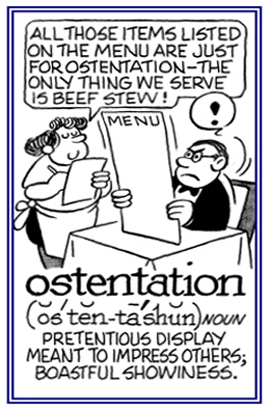-ation, -ization (-iz[e] + -ation); -isation (British spelling variation)
(Greek > Latin: a suffix; action, act, process, state, or condition; or result of doing something)
Although there are over 1,450 word entries ending with -ation or -ization listed in this unit, there are certainly many more which exist in the English language. At any rate, this unit provides a significant number of -ation and -ization examples for you to see.
opsonization, opsonisation (British) (s); opsonizations, opsonisations (pl) (noun forms)
The making of bacteria and other cells subject to phagocytosis by the action of an opsonin (antibody).
oration
1. A speech, lecture, or other instance of formal or ceremonial public speaking.
2. A speech that is considered pompous, boring, or inappropriately long.
3. An academic speech that is designed to show the speaker's rhetorical skills, especially a speech given as an exercise in public speaking, often in a public speaking contest.
2. A speech that is considered pompous, boring, or inappropriately long.
3. An academic speech that is designed to show the speaker's rhetorical skills, especially a speech given as an exercise in public speaking, often in a public speaking contest.
orchestration
The naming of an individual to a specific role within a religious institution: Adam's family was attending his ordination as an assistant pastor in their church.
organization
1. A group of people identified by shared interests or purposes, such as a business.
2. The coordinating of separate elements into a unit or structure.
3. The coordinating of separate elements into a unit or structure or the efficiency in the way separate elements are arranged into a coherent whole.
2. The coordinating of separate elements into a unit or structure.
3. The coordinating of separate elements into a unit or structure or the efficiency in the way separate elements are arranged into a coherent whole.
orientation
1. The position of a tag antenna vis-a-vis a reader antenna.
2. Alignment of the tag with respect to the reader or tag.
With UHF systems, readers can be either circular-polarized or linear-polarized. When using a linear polarized antenna, the tag reader and antenna reader must be in alignment in order to achieve the longest reading distance.
If that tag antenna is aligned vertically and the reader is sending out signals horizontally, only a small portion of the energy emitted by the reader will will hit the tag antenna.
origination
Precipitation which results from the lifting of moist air over a topographic barrier; such as, a mountain range: "The orographic precipitation may take place at some distance upwind or a short distance downwind, as well as on the barrier itself."
oscillation, oscillational
1. The action of oscillating; movement to and fro; periodic motion about a position of equilibrium, as the swinging of a pendulum.
2. Vacillation, fluctuation, or wavering between two states, opinions, principles, purposes, etc.
3. Variation consisting of alternate increase and decrease without convergence to a limit or divergence.
2. Vacillation, fluctuation, or wavering between two states, opinions, principles, purposes, etc.
3. Variation consisting of alternate increase and decrease without convergence to a limit or divergence.
oscitation
The act of yawning, the involuntary opening of the mouth with respiration, breathing first inward, then outward.
1. The act of touching each others lips together.
2. In mathematics, a contact, as between two curves or surfaces, at three or more common points.
2. In mathematics, a contact, as between two curves or surfaces, at three or more common points.
Control of the volume and composition of body fluids: Osmoregulation relates to the adjustment of osmotic pressure particularly in a body of a living being.
ossification
1. A showy display, as of wealth, knowledge, etc.; pretentiousness: Art was trying to impress the girl at his school with the ostentation that he knew all of the answers to the homework assignment that the teacher had given them for the test on the following day.
2. Etymology: from Latin ostentation-; from the verb ostentare, "to frequent" of ostendere "to stretch out to view".

© ALL rights are reserved.
Go to this Word A Day Revisited Index
2. Etymology: from Latin ostentation-; from the verb ostentare, "to frequent" of ostendere "to stretch out to view".



